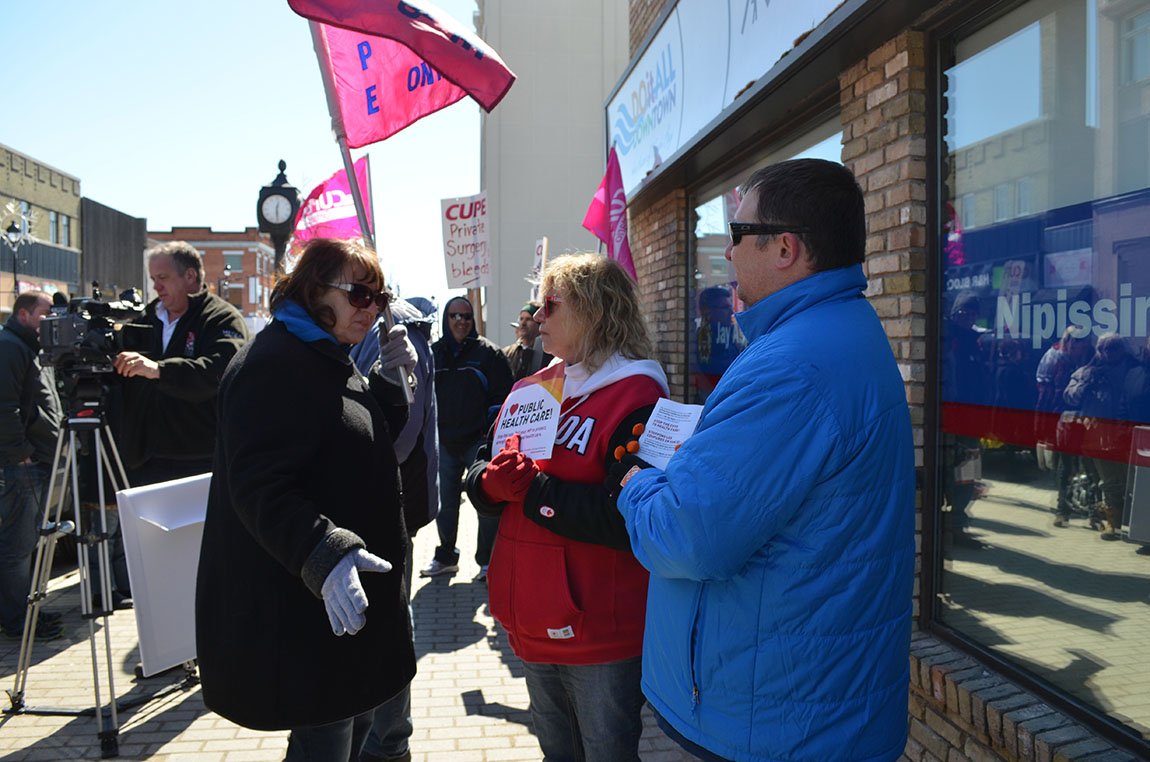
From left, Louise Walker, Shirley Edes and CUPE president Shawn Shank hold signs and flags at a rally in front of MP Jay Aspin's office. The rally urged the MP to speak with Harper and form a new Health Accord and end cuts in health care. PHOTO BY CHRISTINE ROY
As a registered practical nurse (RPN), Louise Walker has seen first-hand the impact of cuts in health care.
On March 31, members of the community gathered in front of MP Jay Aspin’s office in a rally to commemorate the one-year anniversary of the “death” of the Health Accord.
Walker stood among them, dressed for the cold weather and holding a sign for the Canadian Union of Public Employees (CUPE).
“In my 40-plus years of nursing, I’ve never seen this kind of travesty,” Walker said.
The travesty she spoke of is the cuts taking place in the health care system. For Nipissing-Timiskaming, that would be $14-billion cuts from health care transfers to Ontario over the next ten years.
This would be the equivalent of losing:
• 23 hospital beds per year
• 33 family doctors per year
• 144 registered practical nurses per year
• 150 long-term care beds; or
• 625 joint replacement surgeries per year
“I’m disturbed by all the cuts that are happening,” Walker stated. “They’ve reduced registered staff and replaced some of us with unregistered staff.”
The unregistered staff are personal support workers (PSW) who are not licensed. The registered staff are held accountable for any mistakes performed by the PSWs.
Walker works in the mental health department at the hospital. While there are no PSWs in her unit, the staff has been reduced and this causes much concern about safety. There have been incidents but discussing them puts the RPNs’ jobs at risk.
Shawn Shank, the president of the local CUPE, was at the rally as well. Shank’s wife has cancer and is getting treatment in Sudbury but the cuts to health care will also affect that region.
“It hurts the people. You have less people helping people,” Shank stated.
Shank is aware of the effects the cuts have had in the community. He won’t go to the hospital unless he absolutely has to, thinking that he might be delaying the care of someone who desperately needs medical attention but has to wait hours before being sent in for examination.
“You can expect to be there for three or four hours, easy,” he said.
For those at the rally, the need for the Harper government to sign a new health accord is unquestionable.
“For nurses, patients come first. For the government, surely not,” Walker said.
To find out more, visit www.saveourhealthcare.ca.


